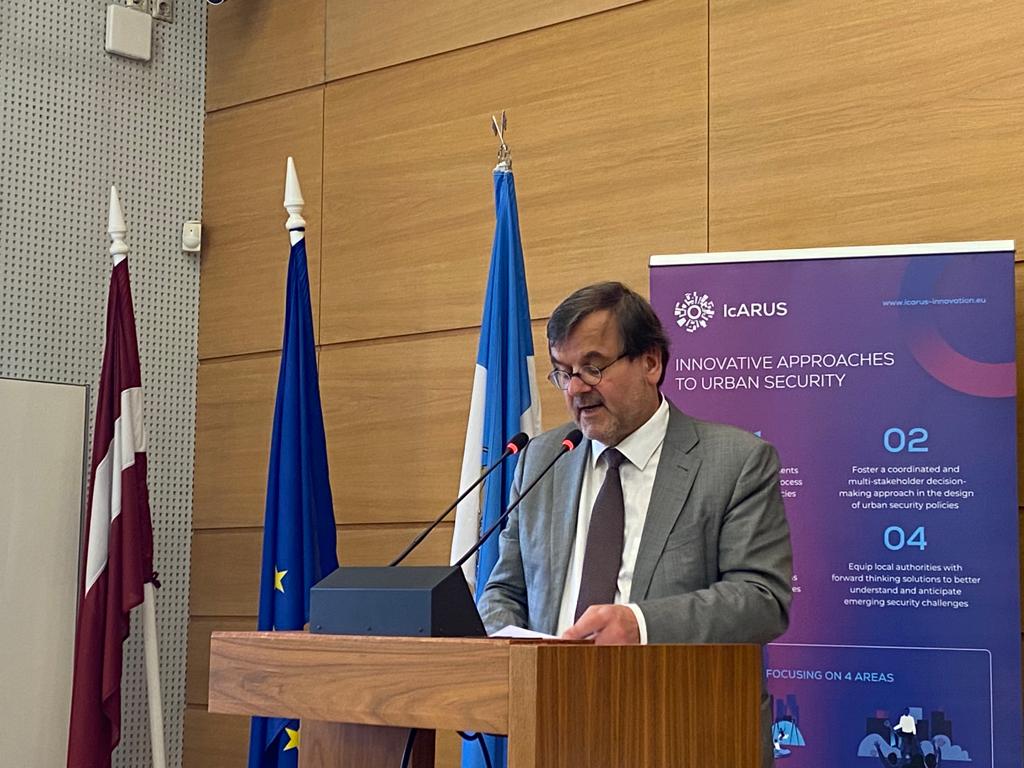Kassel, Germany, October 2020 – The 25th German Prevention Congress, which was hosted by the city of Kassel and held online on 28 and 29 September, focused on the impact of the digital revolution on urban security and crime prevention. Founded in 1995, the German Prevention Congress (DPT) is the world’s largest annual conference on crime prevention and related prevention areas. Efus and the German Forum DEFUS are long-standing partners of this conference.
Enriching the on-going work on security and innovation
This year, Efus attended the event with the aim of enriching its knowledge base and on-going work on the topic of security and innovation, which it carries out through its eponymous working group. The exchanges held over two days also provided food for thought for Efus as a partner of the current Cutting Crime Impact European project, which seeks to develop innovative tools to reduce feelings of insecurity linked to petty crime.
Working towards a vision of “Smart Prevention”
Digitalisation impacts all aspects of life, including ever changing urban security challenges and the preventive responses to the latter. New problems warrant new solutions and while both are plentiful, our understanding of them is still evolving. The German Prevention Congress thus focused on this area with the aim of getting a step closer to a vision on “Smart Prevention”.
Efus took part in two events:
- The opening panel discussion on Smart Prevention with Johannes Baldauf (Facebook), Markus Beckedahl (Netzpolitik – an online platform for the digital right to freedom), Matthias Heeder (filmmaker at Rhizomfilm) and Gesa Stückmann (Jurist). The panel discussed the ways in which digital technologies present opportunities, but also security risks, and which new and “smart” forms of prevention initiatives can respond to these risks.
- A webinar on Smart Prevention with a focus on predictive policing and human rights led by Dr Ingrid Bausch-Gall (Amnesty International).
Predictive policing in the spotlight
Speakers and participants at both events outlined that there are two types of predictive policing models. The first is based on geo-spatial data and aims to predict probable locations of crime, most notably home burglaries. The second model uses data linked to personal attributes and aims to identify individuals at risk of being victims or perpetrators of criminal activity. While both approaches entail the risk of unwarranted stigmatisation of certain groups of population, the latter is seen as more concerning.
Predictive policing, as any technology that is developed to support (or, in some parts of the world, substitute) decision-making, is only as good as the data it feeds on during its learning process. In her webinar, Dr Ingrid Bausch Gall, a retired mathematician, highlighted that a number of questions about this data need to be addressed: Where does it come from? For what purpose was it collected? Who does the data belong to?
A new way of collecting data – a new way of responding to threats?
These questions lead to another one: what to do with the information provided by the predictive policing algorithm? Both Matthias Heeder and Markus Beckedahl argued that technology cannot replace human resources. Most of the time, law enforcement agencies (LEAs) send more patrols to neighbourhoods identified to be at risk. This begs the question of whether this response might have unintended consequences in other areas or unnecessarily stretches LEAs’ resources.
The panel also considered the question of whether increased police presence is an adequate response. In its current form, predictive policing is concerned with the interception of criminal activity but less so with social prevention even though it can prevent criminality in the longer term.
What measures to mitigate risks?
Dr Ingrid Bausch Gall listed a number of recommendations to mitigate the risks that predictive policing pose to fundamental rights such as the right to privacy, to data protection and to non-discrimination.
Concerning the development of predictive policing algorithms, safeguarding measures include ensuring verifiability and putting in place independent evaluators as well as diverse and transdisciplinary development teams that include civil society members.
Concerning the deployment of the technology, it should be simple to use and not be only accessible to experts. LEAs should outline clear use purposes and consider outputs from a critical, unbiased perspective.
The CCI project and predictive policing
Efus is particularly interested in exploring the benefits and challenges of using predictive policing for urban security as a number of LEAs in Europe are working with or starting to develop predictive policing models. One of Cutting Crime Impact’s focus areas is indeed this technology, and over the past two years the CCI partners have been examining various predictive policing models currently in use in Europe.
> More information on the Security & Innovation working group on Efus Network





